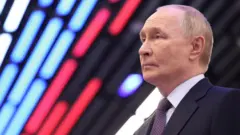Sometimes it's not what's said that makes the biggest impression.
It's the reaction.
In the Russian Far East, Vladimir Putin delivered a warning to the West: don't even think about sending soldiers - and that includes peacekeepers - to Ukraine.
If some troops appear there, the Russian president said, especially now while the fighting's going on, we proceed from the premise that these will be legitimate targets for destruction.
Then the reaction.
The audience at the economic forum in Vladivostok burst into applause, with Russian officials and business leaders apparently welcoming the threat to destroy Western troops.
Observing the scene in the hall, I found the applause quite chilling.
And this came just a day after Kyiv's allies, the so-called Coalition of the Willing, had pledged a post-war reassurance force for Ukraine.
Putin's remark was notable, but so was the subsequent applause from the audience, demonstrating a potentially troubling consensus among those present.
Moreover, the Kremlin leader expressed willingness to meet Ukraine's President Volodymyr Zelensky, but only on Russian grounds, a proposal dismissed as unserious outside Russia.
This encapsulates the Kremlin's approach toward the conflict: a desire for peace, but solely on their terms.
Putin's uncompromising stance stems from several sources: a belief in military superiority in Ukraine, goodwill gestures from allies like China and North Korea, and growing confidence fueled by perceived failures of Western diplomacy and sanctions.
As the conflict continues, Russia remains resolute in its objectives, painting a stark contrast to the views held by Ukraine and its European allies. The outlook for peace is foggy, indicating divergent paths between the opposing sides, with each guided by distinct agendas and differing aspirations for the future.


















